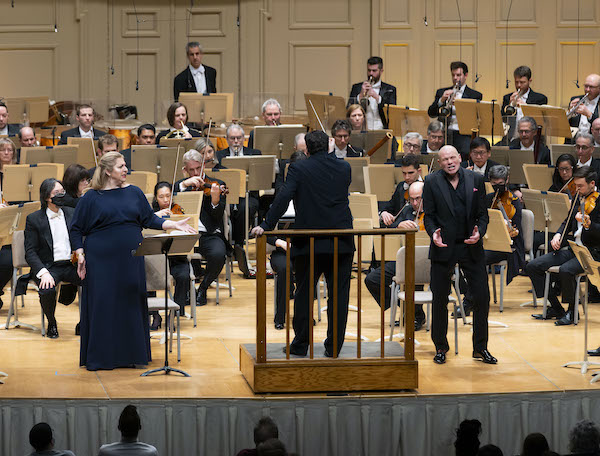Skovhus’s noble performance makes BSO’s “Wozzeck” a devastating experience

Andris Nelsons conducted the BSO in a concert performance of Berg’s “Wozzeck” Thursday night with Bo Skovhus and Christine Goerke. Photo: Winslow Townson
There’s hardly a more fittingly bleak opera for our tumultuous times than Alban Berg’s Wozzeck. An adaptation of Georg Büchner’s incomplete 1837 play that follows the demise of its title character at the hands of an uncaring, mocking society, Berg’s first opera is a grim and challenging work.
Yet the Boston Symphony Orchestra’s performance of the score Thursday night at Symphony Hall was anything but bristly or off-putting. Quite the contrary: in the hands of BSO music director Andris Nelsons, this was a Wozzeck marked by touching humanity and rich shadings of character.
Completed in 1922, Wozzeck offers a striking study of contrasts. Though hailing from the lowest rungs of their social caste, the soldier Wozzeck and his common-law wife, Marie, provide the opera its unexpected moral center. Both are aware of their personal shortcomings. They also, heartbreakingly, understand the reality of their circumstances: “I’m a poor man,” Wozzeck sings in Act 1, “men like me will always be doomed in this world.”
Unfortunately, no such awareness inhabits the thinking of Wozzeck’s social betters, including the vain, hypochondriacal Captain and the pompous Doctor, whose quack dietary experiments Wozzeck goes along with for the meager financial rewards they allow him to pass on to Marie. As for the thuggish Drum Major who seduces Marie, he’s simply driven by base, animal lust.
Taken together, Wozzeck’s existence is brutal and unforgiving, its joys fleeting—exemplified primarily in the couple’s unnamed son—and punishments cruel. Indeed, the character’s mental breakdown, which culminates in his murder of Marie and subsequent drowning, is, for all its inevitability, immensely challenging to present sympathetically.
On Thursday, Bo Skovhus, in his Symphony Hall debut, exhibited just the necessary combination of control and desperation to achieve the desired effect. Singing with absorbing intensity, the Danish baritone fully inhabited his part, imbuing the role with a nobility one rarely associates with it.
That sympathetic quality helped make Wozzeck’s ultimate collapse even more tragic. Especially considering the absurdities and injustices with which he must contend—the Captain’s ridiculous philosophical soliloquies, the Doctor’s preposterous physiological theories, the Drum Major’s braggadocio, among them—Skovhus’s Wozzeck commanded compassion and wariness in equal measure.
As Marie, soprano Christine Goerke sang with lustrous tone and gleaming projection across her range. While Goerke’s performance affectingly mined the character’s reservoirs of inner strength, the moments of reflective tenderness—like Marie’s biblical meditation at the start of Act 3—stood out powerfully by way of contrast.
In other roles, bass Franz Hawlata proved an agreeably pompous Doctor. Tenor Toby Spence articulated the Captain’s part with spirit and energy, though he struggled to project over thick orchestral textures. So, at the end of Act 1, did tenor Christopher Ventris’s Drum Major; his return in Act 2, though, was fittingly swaggering and contemptuous.
As Margret, mezzo-soprano Renée Tatum brought mocking steel to her character’s bitchy Act 1 exchanges with Marie, while her pivotal third act reappearance was electrically charged.
Highlights of smaller parts included Mauro Peter’s pure-toned Andres, Zachary Altman and David Kravitz as a pair of proverb-spouting apprentices, and a beguiling sextet of children’s voices (Linus Schafer Goulthorpe, Shira Argov, Jesse Bargar, Antonia Rosalind Hotspur Duffield, Juliet Genevieve Hotspur Duffield, and Navaa Malihi) in the opera’s chilling final scene.
For his part, Nelsons drew a performance from the BSO that exulted in Berg’s lustrous scoring. Perhaps unsurprisingly, given the size of the ensemble, the complexity of the music, and the evening’s concert staging, balance issues and spotty ensemble moments dotted the night.
Even so, from the burbling, dancing energy that marked the opera’s opening to the glassy figurations and murky harmonic progressions that accompanied Wozzeck’s death, Thursday’s was a stirring, broadly sensitive performance. Its extremes were powerfully articulated and the several allusions to vernacular forms came over strongly.
Particularly compelling was the BSO’s playing during the instrumental transitions between Wozzeck’s fifteen scenes, culminating in a surging, majestic account of the great D-minor Interlude in Act 3. In the last, all of Wozzeck’s lyrical threads culminated in a sumptuous, beautifully shaped and textured tapestry. For once in the opera, everything seemed to be, if not at peace, then at least settled—until the children, carrying on in the manner of their elders, started teasing Wozzeck’s and Marie’s son.
Far from dying with Wozzeck, the vicious cycle of life continues.
Wozzeck will be repeated 8 p.m. Saturday at Symphony Hall. bso.org
Posted in Performances